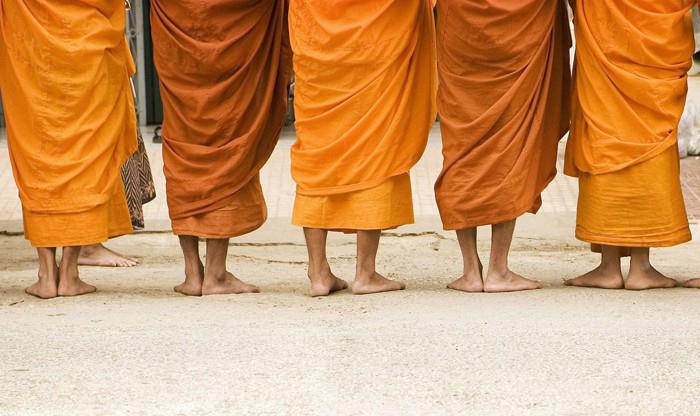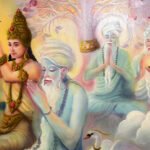A mother has a tremendous love towards her children no matter how they become to be. She takes that love even to her last breath when she gets old and sick and close to her death. When seeing such a mother becomes grievously ill, a child would also feel sad about their mother’s status. As birth brings decay, sickness, and death to all the beings no matter how powerful they are, everyone feels sad and helpless when someone they love becomes ill and when they see them suffer. According to the Supreme Buddha’s teachings, we know that this is not the only life that we had to go through such a pain. The Supreme Buddha taught us that the amount of tears we have shed in our past lives seeing our mother getting sick or dying is larger than the amount of water in the ocean. It is in fact the same for all beings since birth brings decay, sickness, and finally the death. This is the noble truth of suffering, which is revealed to us in the Noble Dhamma found by the Supreme Buddha. Not just the noble truth of suffering, but also the noble truths of cause of suffering, cessation of suffering, and the path leading to the cessation of suffering are shown in the Noble Dhamma.
Following this noble path, taught by the Supreme Buddha, when a disciple attains the noble bliss of freedom from suffering he is known as an Arahanth who is the greatest individual of the Noble Sangha.
In Thera Gatha, Arahanth Mānhava Thero says, “After seeing a decayed old person, a suffering sick person, and a dead person who spent his lifespan, I freed myself from the sensual pleasures and household life.” This is the remarkable nature of the Noble Sangha. When all other ordinary people become sad, cry, suffer, pray for good health or freedom from death, or sometimes try to ignore the decay, suffering, and death, it just takes only a moment for these great disciples to see the truths disclosed by the Supreme Buddha. The disciple monks had sharp minds and wisdom to see the truth of this life. Moreover Arahanth Channa Thero says, “There’s an extraordinary taste in the Dhamma preached by the Supreme Buddha with His noble mind. It’s invaluable. I disciplined myself according to that Dhamma. I only had the intention of attaining the wisdom of the Four Noble Truths. Our great teacher, the Supreme Buddha, shows this Dhamma with a remarkable talent.” The noble monks greatly valued and honored each noble word that was generated in the astounding mind of the Supreme Buddha. They listened to the Noble Teachings of the Supreme Buddha, store it in their minds, tried hard to practice it, and see it through their lives, “It is indeed wholesome to listen to the Dhamma. It is indeed better to practice that listened Dhamma. Living a life without any desire is indeed good. It is also wholesome to contemplate on the Dhamma that’s been heard. Welcoming the Dhamma reverently is indeed wholesome”. This is a stanza preached by Arahanth Kumāputtha Thero.
There are many groups of people in this world. There are groups based on religion, politics, or various beliefs. Some people become well known according to some deeds they perform based on these beliefs, but same principles or deeds can betray them in a tragic way leading to their own downfall after sometime. However, the noble disciples of the Supreme Buddha are different from the ordinary people. They are supreme to all beings in the world. They have reached the most superior status. If anyone develops confidence or a pleasant mind towards the noble Arahaths, their reward is indeed superior as their confidence is towards the most superior individuals in the universe. The Supreme Buddha explained the qualities of an Arahanth in these stanzas.
Sukhino vata arahanto – tanhā tesam na vijjati
asmi,māno samucchinno – moha,jālam padālitam
Happy indeed are the Arahats! – all three types of cravings are not found in them.
They have cut off the conceit “I am,” – broken through the net of delusion.
Anejam te anuppattā – cittam tesam anāvilam
loke anupalittā te – brahma,bhūtā anāsavā
They have reached the unshakable Nibbana – their minds are without any disturbance,
Unsullied by the world are they – become perfect, free from defilement.
Pañcakkhandhe pariññāya – satta saddhamma,gocarā
pasamsiyā sappurisā – puttā buddhassa orasā
Having fully understood the five aggregates – they are of seven good qualities
These praiseworthy true individuals – are the sons of the Buddha.
Satta,ratana,sampannā – tīsu sikkhāsu sikkhitā
anuvicaranti mahā,vīrā – pahīna,bhaya,bheravā
Endowed with the seven jewels – trained in the three trainings,
The great heroes wander about – having abandoned fear and trembling.
Dasahamgehi sampannā – Mahā,nāgā samāhitā
ete kho setthā lokasmim – tanhā tesam na vijjati
Endowed with the ten factors – are like great tuskers, mentally concentrated
They are indeed superior in the world – there is no craving in them.
Asekhañānam uppannam – antimoyam samussayo
yo sāro brahmacariyassa – tasmim aparapaccayā
The wisdom has arisen in them – this is the last body to be borne,
The heart of the holy life – is in him, and live independent of others
Vidhāsu na vikampanti – vippamuttā punabbhavā
danta,bhūmim anuppattā – te loke vijitāvino
They tremble not at discrimination – released from rebirth,
Having reached the ground of the tamed – they are conquerors in the world.
Uddham tiriyam apācīnam – nandī tesam na vijjati
nadanti te sīhanādam – buddhā loke anuttarā’ti
Above, across, below – there is no craving in them,
Roaring their lion-roar – ‘the Buddhas are supreme in the world!’
As the Supreme Buddha explains the qualities of the most superior individuals in the universe, He goes on to teach us the qualities of the great Sangha with a great compassion towards us, so that…
The Supreme Buddha taught us the qualities of the great Sangha with a great compassion towards us, so that we could gain merits by thinking and chanting these qualities, and follow such life patterns and free ourselves from suffering by adding those qualities to our lives as well.
The noble Sangha discipline their lives in virtue, concentration, and wisdom in order to eradicate desire, hatred, and ignorance, hence the noble Sangha is “Supatipanna”.
They have entered into the noble Eight-fold Path, the straight path, to free from suffering with great effort and mindfulness and therefore they are known as “Ujupatipanna”.
The Noble Sangha is disciplining in order to realize the Four Noble Truths. This is why the Noble Sangha is called “Gnāyapatipanna”.
The Noble Sangha spread the Noble Dhamma with great compassion towards both deities and humans. Because the Noble Sangha spread the Dhamma around the world with a great respect, they are also known as “Sāmichipatipanna”.
There are four pairs of disciples, eight as individuals based on the path and what they have achieved –Stream enterer, Sotapanna – once returner, Sakadăgămii – non-returner, Anăgămii and the Arahath.
All these noble Sangha are suitable to accept Siwpasa [robes (clothing), alms, accommodation (house, hermitage, or huts), and medicine] that are brought from far and offered to them. This is why the great Sangha is known as “Aahunheyya”.
Moreover, the Sangha is suitable to be offered with the Siwpasa when they are guests. The Noble Sangha is therefore called “Pāhunheyya”.
The Noble Sangha is also called “Dakkhinheyya” because any offering to them bring great merits to the giver.
Both humans and deities worship the Noble Sangha because they are suitable for their homage and thus known as “Anjalikaranhiiya”.
The Noble Sangha is the foremost group of people that can bring merits for all deities and humans of the world. If one either honors, worships, or offers something to the Noble Sangha with devotion, that person will get the foremost merits that one could get by any offering or veneration to a group of people. That is why the Noble Sangha is called the “Anuttaran Pugngnakkhettan Lōkassāti”.
Let us use this rare opportunity to learn about these great individuals and build confidence towards them. Let us be fortunate to remember the great qualities of the Noble Sangha, venerate them whole heartedly and gain merits to follow their footsteps.
By Chinthaka Silva












Recent Comments